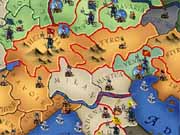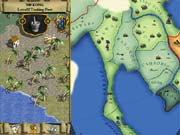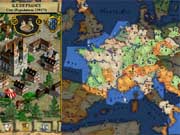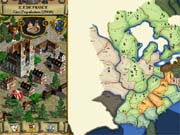Although there have been many conquest and empire management games for the PC over the years, no such game to date compares with the historical detail and scope of Europa Universalis. It plays somewhat similarly to turn-based games such as Civilization II and Imperialism II, but with a focus on the European continental and overseas empires from 1492 to 1792. This tighter focus lets the game be amazingly specific, as the world map encompasses more than 700 provinces to be explored, conquered, and developed by the 60 or so major and minor nations. Given how much time was necessarily involved in compiling the game's extreme level of historical detail, it's hardly surprising that it's based on a board game. However, once you get past the initial shock of how big and occasionally unwieldy the game is, you'll find that the detailed mechanics work to produce an unparalleled level of depth.

There's plenty of opportunity in Europa Universalis for expanding your empire through military conquest, diplomacy, and mercantilist economics, but it's less about outright world domination than swinging the balance of power in your nation's favor. The game contains 11 scenarios that center on key periods like the War of Independence or the Thirty Years War, where each major nation involved has specific objectives to accomplish. But truly, the heart of the game is the campaign that starts you out in 1492 and challenges you to be the clearly dominant force by 1792. The campaign doesn't artificially level the playing field, so some nations are much stronger than others from the start. But the sheer number of nations competing for power means that no nation is big enough to go at it alone. While commerce and steady research are important considerations, the path to power lies between the complementary poles of war and diplomacy.
Europa Universalis starts out right at the turning point for modern Europe, when newly united major powers set their sights on the wealthy Italian states and started profiting from early overseas colonies. Real historical events punctuate the campaign, often changing the dynamics. Shortly into the game, the Reformation breaks out across Western and Central Europe, which suddenly makes religion a factor in diplomacy and in maintaining the internal stability of your empire. There's the option of converting to appropriate alternatives to your nation's religion (including Calvinism, Counter Reformation Catholicism, or Shia Muslim, depending on the region) and to set tolerance levels for other faiths, which consequently affects how adverse their believers are to your government. It's pretty unusual for a game to make religion such a dynamic political force, but it works out to be a global setting that you'll tweak only once in a while, rather like government types in Civilization.
Since there are so many minor independent powers, diplomacy in Europa Universalis involves numerous loose alliances that can string together half a dozen countries at once. In times of conflict, this can make the game seem chaotic, as declaration of war by an ally on the opposite side of Europe can soon engulf the whole continent in war. Relations with computer-controlled nations are indicated clearly by a numerical scale, which is influenced by such things as diplomatic gifts or letters of insult. It's all handled abstractly, so you won't see talking heads or even much of a description of your diplomatic efforts' outcome. But in spite of this lack of flourish, diplomacy is unusually well integrated into the game.

As if by following Sun Tzu's famous advice, you'll quickly find in the game that war and diplomacy are inseparably entwined. It's impractical to wage a sustained and indiscriminating war, because provinces don't actually change hands until a peace treaty settles things. It's impossible to just march a large army at your opponents and expect to gain much territory in one swoop, but border wars are nonetheless effective over time. Again showing its board game roots, Europa Universalis handles combat statistically, factoring a healthy dose of chance in with the factors of morale, leadership, and technology so that the bigger army can be in for a surprising defeat. Military research and production is also a simple affair. There are just basic unit types--infantry, cavalry, and artillery--and numerous small research steps will transform your army from pikemen into musketeers and, later, into orderly Napoleonic-era infantry.
Considering the importance of military victory in deciding the fate of your nation, it's somewhat disappointing that so many of the variables in the combat system are hidden from view. While the documentation makes an interesting foray into describing the period's military history, there isn't a specific explanation on how combat is decided. Furthermore, the historical leaders that pop up periodically seem to give a disproportionate advantage to the armies they lead. Later in the game, you may have many qualified generals, admirals, and explorers, and absolutely none at other times. While morale plays a large part in battle, there's no experience system to increase the value of veteran troops. Attrition is another significant consideration that works invisibly, eroding troop numbers inexplicably until you pay close attention to the documentation's explanation of the transparent supply line system. These factors add to the game's depth after you've spent enough time working through the system, but such basic mechanics should have been better explained.
Like some recent space conquest games, Europa Universalis uses real-time mechanics instead of dividing your time up into turns. Of course, when there's a lot going on, it's simpler to pause the action to issue simultaneous orders or slow things down to watch each day pass at a comfortable rate. But during times of peace and prosperity, it's easy to speed things up dramatically, which helps the 300-year grand campaign seem less overwhelming. The interface also helps you keep track of managerial events, like when your troops reach their destination, with a system of pop-up windows. These manage to be more useful than annoying, mainly because it's easy to customize whether events are announced in pop-ups or in the scrolling log at the bottom of the screen. In addition to making the game flow more smoothly, the real-time engine has its uses in troop movements--it lets you march reinforcements in to help in a sustained battle or adjust your border defenses while watching the enemy's actions.

For a game of its depth, it's refreshing that Europa Universalis requires relatively little micromanagement. Since your empire won't crumble away during times of peace, some might take it as an excuse to sit back and watch history move on its own, like an antique orrery. One of the game's key automation features comes in the trade component, as the game lets you delegate continued competition to markets to your state's treasurer. Trade is an important source of income if you can gain monopolistic status in large markets, but once you deliberately place merchants early in the game to gain competitive footholds, there's little to do but watch the gold trickle in. The automatic routines do a competent job of maintaining your market position so that you can pay attention to more urgent tasks. When it comes to your economy, there are tons of variables under the hood--variables that you don't need to while managing your empire day to day. However, it can be useful nonetheless to take a break every decade or so to sift through the charts and graphs that compare your nation's progress to the other major powers. Over the long term, you will see the causes and effects of inflation and will be able to invest in infrastructure to indirectly increase production or census tax income.
Unfortunately, Europa Universalis' relatively straightforward gameplay can be initially more overwhelming than it needs to be. There's an in-game tutorial that does successfully introduce the most basic game mechanics, but it's overly long and scripted with such specific goals that it ends up being more frustrating than useful. And although the manual covers topics thoroughly in its 120 pages, it's written in a dense, descriptive style that's poorly suited to getting you quickly up and running in a first game. The saving grace is that the game interface includes pop-up hints to explain most essential functions. The grand campaign in Europa Universalis is more time-consuming than a typical game of Risk, but it will take a run-through to really grasp the game's mechanics and start to understand the complex underlying rule set in order to take advantage of it. Once you do get up to speed, there are plenty of options to keep the game interesting for a long time, as the grand campaign itself offers eight different playable nations, which each naturally require very different strategies. The game doesn't balance the playable nations in multiplayer either, so if you do get a game going with the two to eight other players that the game supports, you'll need to agree beforehand how to divvy out the starting places. There's also no in-game player matching, so it can be a challenge to find opponents for Internet games in the first place. The game's mechanics aren't particularly friendly to multiplayer, as they require the real-time speed to be set before a campaign begins. Fortunately, it's possible to save a game in progress and come back to it later if you can get your opponents back together to continue.

The game's visuals and audio are also not impressive. The hand-drawn map that makes up most of your view is more remarkable for its attention to historical provincial boundaries than for its artistry. The 256-color graphics are attractive at the highest zoom level, but they quickly lose their crispness at even just the next step out. Europa Universalis is even more Spartan in its audio, as it includes sound effects only for important military and diplomatic events. We had difficulty getting the music to run at all and found the classical instrumentals to be cloyingly synthetic-sounding when they did play.
The ambitious historical setting that distinguishes Europa Universalis won't appeal to everyone, but the polished gameplay definitely makes it worthwhile. The delicate nature of diplomacy in an early modern Europe splintered by feudal territorialism and religious conflict makes the game challenging. There's always a fire to put out, whether it's internal rebellion, alliance shifts, or border wars. For a game of its complexity, Europa Universalis is remarkably polished and stable and has clearly benefited from several updates since its release in Europe last year. It may not be as accessible as Sid Meier's turn-based strategy classics, but Europa Universalis succeeds in creating a new dynamic for an old genre.